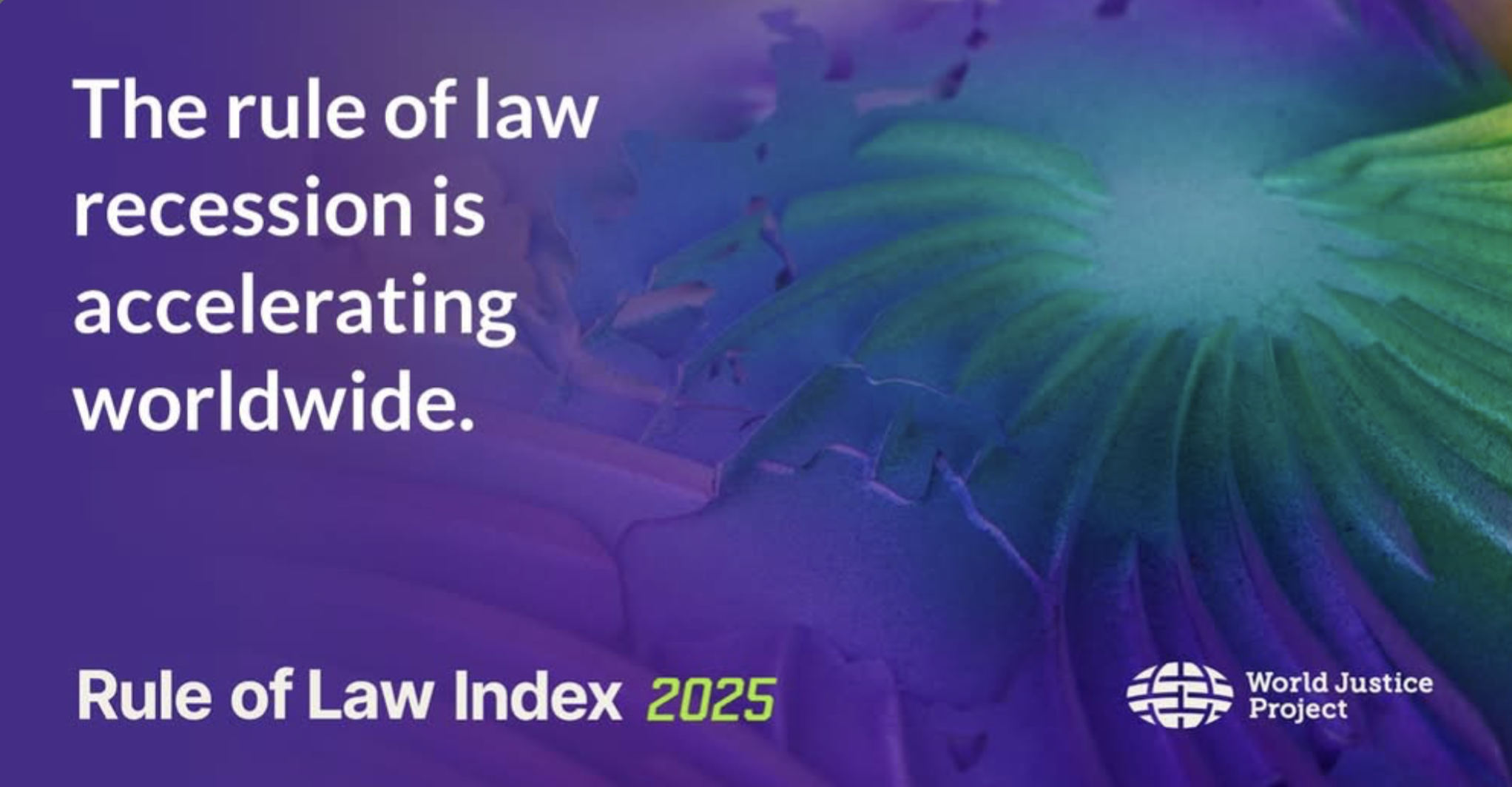

MEDIA CONTACT: [email protected]
Global Rule of Law Recession Accelerates as Authoritarian Trend Deepens, WJP Index Finds
Decline in judicial independence and shrinking civic space signal heightened risk to democracy worldwide
WASHINGTON (October 28, 2025) – The global rule of law recession has accelerated, according to the new WJP Rule of Law Index® 2025. A stark 68% of countries declined in their rule of law in 2025, compared to 57% in the previous year.
The WJP Rule of Law Index is the world’s leading source of original, independent rule of law data for 143 countries and jurisdictions.
“The steady deterioration in the rule of law had slowed in recent years. This year, however, we see a sharp reversal: more countries are declining, and fewer are improving.” said Alejandro Ponce, WJP’s Executive Director.
The disparity between rule of law improvements and declines is widening. In the last year, countries that improved saw an average score gain of 0.52%; meanwhile, countries that deteriorated saw an average decline of twice that: 1.07%. This difference highlights that while building resilient rule of law institutions can be a long and iterative process, dismantling them can happen rapidly.
A rise in authoritarianism is driving the rule of law recession
An expansion of authoritarian trends – namely a reduction in civic space and weakening checks and balances – has been the primary force behind this downturn, with deep declines in factors measuring Constraints on Government Powers, Open Government, and Fundamental Rights.
Three key indicators of government accountability fell in most countries:
- Independent auditing and oversight of government powers declined in 63% of countries.
- Legislative checks on executive power declined in 61%.
- Judicial limits on government power declined in 61%.
Similarly, freedoms essential to civic space, public debate and government oversight eroded across most countries:
- Freedom of opinion and expression fell in 73% of countries.
- Freedom of assembly and association fell in 72%.
- Civic participation fell in 71%.
Judicial independence, the last line of defense against executive overreach, is weakening
The Index shows that judiciaries are losing ground to executive overreach, with rising political interference across justice systems. Indicators measuring whether the judiciary limits executive power and whether civil and criminal justice are free from improper government influence declined in 61%, 67%, and 62% of countries, respectively.
More broadly, civil justice weakened in 68% of countries. This decline reflects longer delays, less effective alternatives to court (such as mediation), and greater government interference.
WJP Rule of Law Index 2025: Key Findings Summary
The WJP Rule of Law Index provides data on eight factors: Constraints on Government Powers, Absence of Corruption, Open Government, Fundamental Rights, Order and Security, Regulatory Enforcement, Civil Justice, and Criminal Justice. Scores range from 0 to 1, where 1 signifies the highest possible adherence to the rule of law. This year, the Index covers 143 countries and jurisdictions, with Qatar integrated for the first time.
- Top-Ranked Countries: Denmark (1), Norway (2), Finland (3), Sweden (4), New Zealand (5).
- Bottom-Ranked Countries: Venezuela (143), Afghanistan (142), Cambodia (141), Haiti (140), Nicaragua (139).
- Top Decliners: The most significant decliners include the Russian Federation (-4.9%), Sudan (-4.4%), and Mozambique (-3.9%).
- Top Improvers: Countries with the largest improvements include the Dominican Republic (2.1%), Senegal (1.6%), and Sierra Leone (1.4%).
Explore the full rankings and findings of the 2025 WJP Rule of Law Index at: http://www.worldjusticeproject.org/index/
- Find graphics (regional rankings, global rankings, and comparative maps) here.
- Find 143 country press releases organized by region here.
About the WJP Rule of Law Index:
The World Justice Project (WJP) Rule of Law Index® is the world’s leading source for original, independent rule of law data. Its rigorous methodology draws on expert and household surveys to measure the rule of law in 143 countries and jurisdictions, covering 95% of the world’s population. The Index relies on more than 215,000 household surveys and 4,100 legal practitioner and expert surveys to measure how the rule of law is experienced and perceived worldwide. Published annually since 2009, the Index is used by governments, multilateral organizations, businesses, academia, media, and civil society organizations.
About the World Justice Project:
The World Justice Project (WJP) is an independent, nonpartisan, multidisciplinary organization working to create knowledge, build awareness, and stimulate action to advance the rule of law worldwide.






